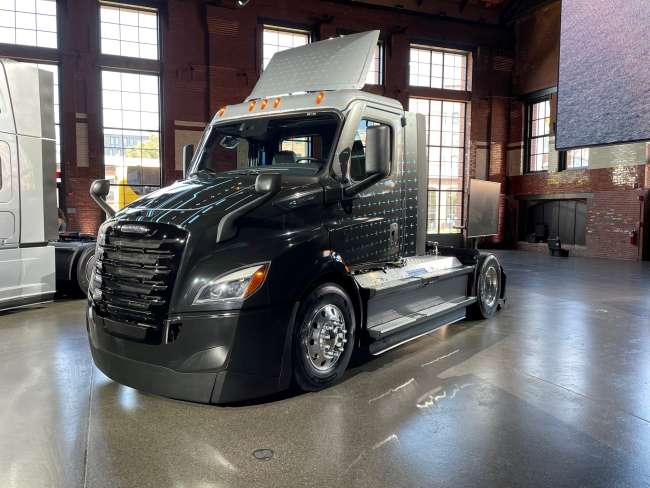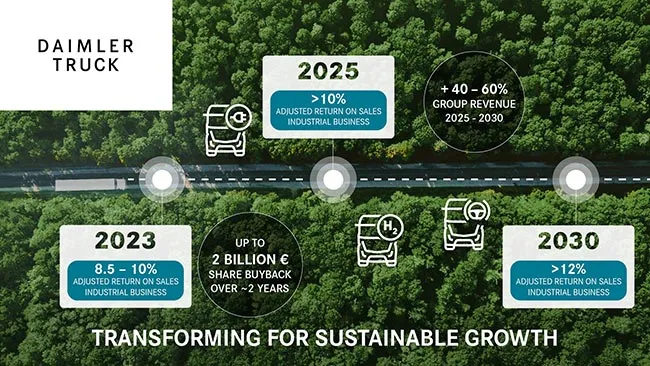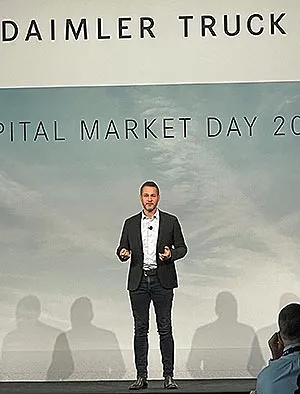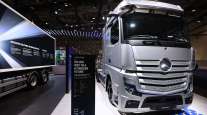Daimler Stresses ‘Transition’ to Green Energy

[Stay on top of transportation news: Get TTNews in your inbox.]
BOSTON — Daimler Truck during a Capital Market Day event recommitted to its ambitions for expansion of alternative fuels across its business, stressing that diesel will remain an important part of the mix while development of battery-electric and hydrogen technologies evolves.
“The speed of decarbonization in trucking is highly driven by the availability of infrastructure and competitive cost of green energy,” the company said in a July 11 news release that accompanied the event. “Thus, the transformation requires a transition phase in which the diesel engine still plays a central role.”
For its heavy-duty engine business, Daimler said it “wants to remain competitive through further scaling, even beyond Daimler Truck.” Daimler Truck CEO Martin Daum said in September from the IAA show in Hanover, Germany, that there will likely be one more evolution of the company’s Detroit 13- and 15-liter engines, and he suggested the industry could be managing the evolution of engine technologies for the next 10 to 15 years. But he also stressed that any collaborative effort from Daimler on heavy-duty diesel engines would be based on Detroit engines.
For medium-duty, the company said it is concentrating on a “non-captive procurement approach of such units in view of the declining volume of diesel-powered vehicles.”

Daimler Truck recommitted to its ambitions for expansion of alternative fuels across its business. (Daimler AG)
Daum in September noted the company chose to go exclusively with Cummins engines for its medium-duty trucks. At the time, he stressed that “Cummins’ starting point is several times larger than ours, so we go with Cummins. It makes no sense — for a small platform — to invest all the money in a market which, over time, will shrink. It’s not feasible.”

“Technology plays a key role at Daimler Truck," says Andreas Gorbach. (Joe Howard/Transport Topics)
Daimler from the Boston event said that to build toward what it called a “zero-emission future,” only a combination of battery-electric and hydrogen-powered systems will give customers the options they need to “solve their transportation tasks sustainably and economically.”
For battery-electric vehicles, the already has the medium-duty Freightliner eM2 and heavy-duty Freightliner eCascadia vehicles on the market. For hydrogen, Daimler said it aims to launch series production of its first fuel-cell powered vehicles within the second half of this decade, powered by the aggregates from Cellcentric, its joint venture with the Volvo Group.
In what it describes as a “potential complementary low-carbon technology for specific customer use cases,” such as those with high power demand, Daimler said it is also considering a hydrogen combustion engine.
“If the corresponding regulatory framework conditions are set, the company can build upon existing diesel engine platforms and provide this technology quickly,” it said.
“Technology plays a key role at Daimler Truck, as it is a crucial lever to increase shareholder value by creating both value for our customers and scale for us,” said Andreas Gorbach, head of Daimler truck technology. “This has always been essential, and even more so in times of transformation.”
Want more news? Listen to today's daily briefing below or go here for more info:




